Frankenstein's monster was right
Dear Newsletter Friends,
This month I feel more in need of advice than capable of giving advice. I’m in one of those periods of “who am I to tell anyone anything?” Maybe you can relate?
But anyway, I am writing this on Halloween, so let’s talk about Mary Wollstonecraft Shelley’s Frankenstein.
Victor Frankenstein is the absolute worst. I am scarred by my early career as a software engineer, surrounded by dudes who were convinced that they knew everything and I could not possibly know anything, and Frankenstein is totally one of those dudes.
The negotiation at the heart of Frankenstein begins in Chapter 10, when the monster finally catches up with Frankenstein on an Alpine glacier after stalking him all over the world. Frankenstein’s immediate reaction is to call the monster a devil and fiend who deserves to die. Not a positive opening.
But the monster is not deterred, and offers a compelling bargain:
“Do your duty towards me, and I will do mine towards you and the rest of mankind. If you will comply with my conditions, I will leave them and you at peace; but if you refuse, I will [not.]”
Still, Frankenstein insists, “Begone! I will not hear you.”
I should probably be fair and mention that at this point, the monster has killed a bunch of Frankenstein’s closest friends and family. And the bracketed “not” above is actually “glut the maw of death, until it be satiated with the blood of your remaining friends.” So I GUESS we can have a little sympathy for Frankenstein here.
But wait, hear the monster out. He spends the next six chapters telling his story. Abandoned by his creator, he wandered the world for years. Despite his early attempts to be kind and benevolent, he was abhorred and attacked by every human he encountered. Now he is alone and miserable.
The monster’s proposed solution is that Frankenstein make him a wife — a companion of his own kind who will not spurn him. In exchange, he and his wife will depart to the vast wilds of South America, where they will dine on nuts and berries, and no human will ever see them again. (We’re in Chapter 17 now if you’re following along. Also, South America sounds very peaceful. I would like to go there.)
Frankenstein is suspicious.
“You swear … to be harmless; but have you not already shown a degree of malice that should reasonably make me distrust you? May not even this be a feint that will increase your triumph by affording a wider scope for your revenge?”
But the monster has a compelling answer:
My vices are the children of a forced solitude that I abhor, and my virtues will necessarily arise when I live in communion with an equal.
Also, the monster could easily kill Frankenstein and really, whoever else he wants.
So Frankenstein concludes that his only choice is to agree. He will make a wife for the monster.
He spends the rest of the book avoiding this responsibility while even more people around him glut the maw of death, as promised. Like I said, absolute worst. (And did I mention why he abandoned the monster in the first place? Because the monster was so ugly that Frankenstein fainted and was bedridden for months.)
There are many possible morals to this story, which I think is why people still read this book. But here’s one. The story is a tragedy, and they both end up miserable and ultimately dead, because Frankenstein fails at creative problem-solving.
Frankenstein supposed to be a genius, but he accepts the monster’s binary of “make me a wife or I kill everyone.” If he paid attention to the monster’s story, he would understand that the monster’s actual problem is isolation and rejection. The solution the monster comes up with is “I need a monster wife,” but his problems could have been addressed in other ways. He could have found animal companionship, like in The Wild Robot. He could have become a farmer. He could have a job in a school for the blind. Frankenstein could have helped him become accepted in a human community.
The moral of the story for me is, if we try to actually listen to each other and think about what we’re capable of doing to help (instead of making empty promises like some monster-creating scientists I could mention), we can avoid a lot of misery.
I wish each of you the amount of candy that is perfect for you. Happy Halloween!




